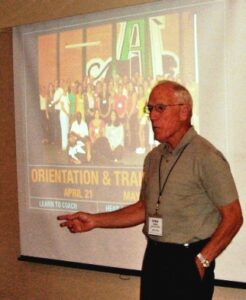Volunteers
FYI: Informational Briefings to the Community
These briefings provided opportunities to share the message about what coaching is and is not. They also described the relationship of coaching, youth, education, and healthy communities. We convened at public places and used slideshow presentations, stories, and a question-and-answer period to share our Vision.
We asked the following questions:
- Would you like to help young people receive the support they need to be happy and successful in this unpredictable and challenging world?
- Could you provide an understanding ear to teens searching to find their voice, or sort out who they are and who they want to become?
- Do you remember the older friend, neighbor, or teacher who made time for you and helped you realize you were important?
We were looking for caring adults who…
- Wanted an opportunity to give back and make a difference in a young person’s life.
- Cared about young people, believe in investing in the future, and can listen well.
- Could see teens for who they really are and do so without judgment.
- Were willing and open to learn new skills of Basic Coaching Conversations as a Volunteer Success Coach.

Interested participants were invited to follow a process to apply and partake in a day-long Orientation and Training. Neither the prospective volunteer nor Touch Point Connection was obligated to proceed until after the applicant was interviewed and assessed by a certified coach and attend the Orientation and Training.
Volunteer Success Coach
Our community volunteers were well prepared for their roles as Success Coaches. They appreciated the thoroughness and professionalism of the selection process.
Six steps were required prior to their first coaching experience:
- Submit an application to Touch Point Connection.
- Complete an application to the school district.
- Get fingerprinted.
- Be interviewed by a Coach Manager (someone who has completed a certified coach training program) and have references checked.
- Attended a day-long Orientation and Training.
- Complete a Policies and Procedures meeting before meeting up with their assigned teen.
Orientation and Training was a full-day event which consisted of:
- What coaching is and is not
- A teen panel to better understand the Life of a Teen Today
- A Coaching Demonstration
- Policies about confidentiality, mandatory reporting, and duty to warn, etc.
- How to create a Sanctuary of non judgment and safety
- Practice that included listening and asking questions.
During their tenure as Success Coaches, support came from their Coach Manager in these forms:
- Just-in-time support
- Workshops
- Information on school district requirements and logistics.
- Tools and models for coaching.
Volunteer Intake
Coach manager and volunteer pledge
6 steps to becoming a volunteer coach
Volunteer Notebook
Our Principle Coaching Model
There are many coaching models and frameworks that coaches can implement. It was incumbent to create a model that gave our volunteers guidance and confidence while simplifying the coaching process. Relying on the foundation of the Coach and Teen agreements, and establishing a sanctuary for the relationship — the model below was generated for our volunteers.
Volunteer Training and Other Supporting Documents
TPC orientation and training slide presentation
Understanding coaching by contrasting words
Volunteer Coach monthly report-sample


